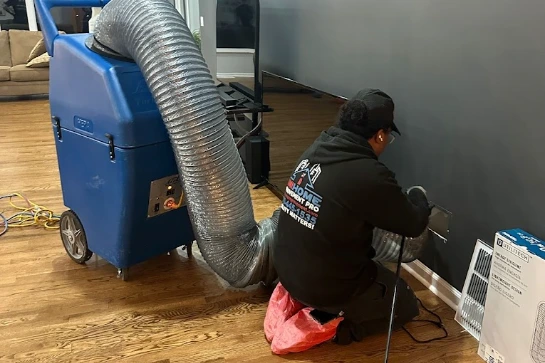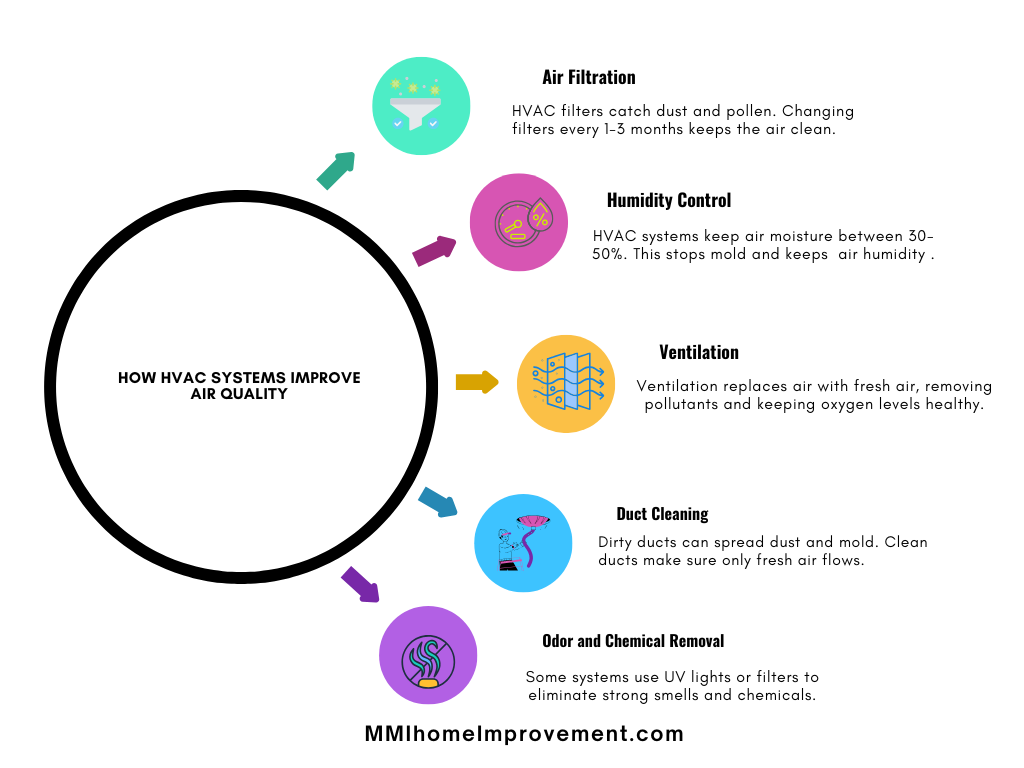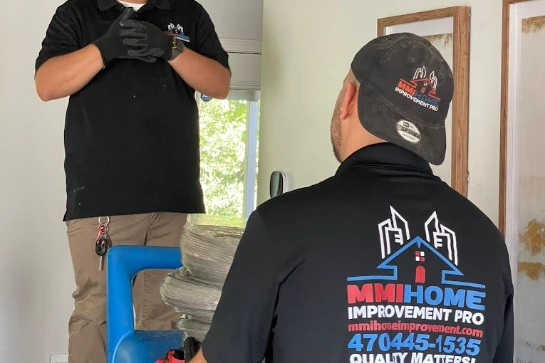Indoor air quality is very important for our health and comfort since we spend most of our time indoors. When the air inside is not clean, it can cause problems like allergies, breathing issues, and feeling tired. A great way to keep indoor air clean and fresh is by using an HVAC system. To make sure your air stays clean, Contact MMI as they are the best service provider for indoor air quality testing and air duct cleaning. They can help your HVAC system work better so you can breathe easier. So, can HVAC systems contribute to indoor air quality improvement? Let’s take a look!

What Is Indoor Air Quality?
Indoor air quality (IAQ) is a way to measure how clean and healthy the air is inside a building. Things like dust, pollen, mold, bacteria, and chemicals from cleaning products or paints can make the air worse. Poor indoor air quality can cause problems like coughing, sneezing, headaches, and tiredness, especially for people with asthma or allergies. One way to improve the air is through air duct sanitizing, which helps clean out dirt and germs from your HVAC system. That’s why keeping indoor air quality good is so important.
How HVAC Systems Help with Indoor Air Quality Improvement
Air Filtration
HVAC systems have filters that trap dust, pollen, and other particles, keeping them out of our air. Some filters, like HEPA filters, are especially good at capturing even the tiniest particles. Changing your HVAC filters every 1-3 months helps keep the air cleaner and reduces allergens.
Humidity Control
Humidity, or the amount of moisture in the air, affects indoor air quality. Too much humidity can lead to mold, while too little can dry the air. An HVAC system can balance humidity, keeping it healthy (around 30-50%) to make the air more comfortable and safe.
Ventilation
HVAC systems bring in fresh air and push out stale air, which is important for good indoor air quality. Fresh air helps remove pollutants and brings in oxygen. Some systems use energy recovery ventilators (ERVs) to bring in fresh air while keeping the indoor temperature steady.
Duct Cleaning
HVAC ducts are like pathways that carry air throughout your home. Over time, dust, dirt, and even mold can build up in the ducts, which can spread pollutants into the air. Cleaning the ducts regularly can help make sure only clean air flows through the system.
Odor and Chemical Removal
Certain HVAC systems have filters or UV lights that break down chemicals and remove strong smells. These special filters can reduce odors from cooking, pets, and chemicals like paint fumes, helping with indoor air quality improvement.

Use the below code to embed this infographic
Tips for Keeping Your HVAC System Clean and Effective
To keep your HVAC system working well for indoor air quality improvement, try these tips:
- Replace Filters Regularly: Change the filters every 1-3 months to keep dust and dirt out of the air.
- Schedule Regular Maintenance: Have a professional check your HVAC system twice a year.
- Clean Vents and Ducts: Make sure vents are free of dust and not blocked by furniture.
- Upgrade Older Systems: If your HVAC system is old, consider upgrading to a new one with better air filtration and energy efficiency.
Signs Your HVAC System Needs Attention
If your HVAC system isn’t working well, it might not help with indoor air quality as much as it should. Watch for these signs:
- More Dust in Your Home: If you notice much dust, it could mean the HVAC filter needs changing.
- Bad Smells: Persistent smells might mean your ducts or filter need cleaning.
- Weak Airflow from Vents: If air isn’t blowing strongly, your HVAC might need maintenance.
- Higher Energy Bills: If energy costs increase, your system might not work efficiently.
If you notice any of these signs, calling a professional to check the system is a good idea. They can help with air duct repair, replacement, or even air duct dry fogging disinfection to make sure the air in your home is clean and healthy.
HVAC Systems in Different Places
HVAC systems aren’t just helpful in homes; they’re important in other places, too:
- Homes: HVAC systems keep homes comfortable by controlling temperature and reducing dust and allergens, which is especially helpful if you have pets or allergies.
- Offices and Schools: In larger buildings, HVAC systems help keep the air fresh for many people, making it easier to concentrate and stay healthy.
- Hospitals: In hospitals, HVAC systems are even more important. They help filter out bacteria and viruses, preventing infections and keeping patients and staff safe.
Benefits of Indoor Air Quality Improvement with HVAC
Using an HVAC system to improve indoor air quality offers many benefits, including air duct repair and replacement.
- Better Health: With fewer pollutants, people are less likely to have breathing issues, allergies, or asthma problems.
- More Comfort: Proper humidity and fresh air make the environment more comfortable.
- Energy Efficiency: A well-maintained HVAC system uses less energy, which can save on utility bills.
- Better Focus and Productivity: Clean, fresh air helps people concentrate better, especially at work or school.
Summary
Can HVAC systems help improve indoor air quality? Yes, they can! HVAC systems clean the air by filtering out dust, controlling humidity, and bringing in fresh air. Taking care of your HVAC system helps keep the air clean so you and your family stay healthy and comfortable all year. Start taking care of your HVAC system today for fresh, clean air!

